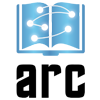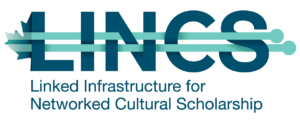Supported Projects
Faculty Principal Investigator: Dr. Laura Mandell

The Advanced Research Consortium (ARC) is an overarching organization that provides support, coordination, and a set of evolving standards for five period-specific virtual research environments (VREs), or nodes. As a hub of humanities research nodes, ARC contains resources spanning the bulk of existing Western written documents, from medieval times to the early 20th century. Each ARC node contains data about existing documents, scanned page images (with text transcriptions), scholarly research related to the node’s documents, and teaching and research tools, including open-source software, that helps humanities researchers to work with digital text and images. ARC coordinates the various resources of the nodes, combining them into a single catalog of metadata, images, and texts, and the ARC nodes provide peer-review for research projects derived from the ARC resources.
BigDIVA
 BigDIVA (Big Data Infrastructure Visualization Application) is a dynamic environment for browsing, searching, and interacting with the ARC (Advanced Research Consortium) catalog. This interface allows users to view all their search results at once rather than paging through endless lists of returns and hoping the search engine has put the most relevant items towards the top.
BigDIVA (Big Data Infrastructure Visualization Application) is a dynamic environment for browsing, searching, and interacting with the ARC (Advanced Research Consortium) catalog. This interface allows users to view all their search results at once rather than paging through endless lists of returns and hoping the search engine has put the most relevant items towards the top.
TypeWright
 TypeWright is a tool for correcting the text-version of a document made up of page images. These text versions are crucially necessary: they are what enables full-text searching, datamining, preserving, and curating texts of historical importance. Right now, the text running behind the page images of these texts has been mechanically typed, leaving behind errors that need to be corrected by human eyes and hands. TypeWright is a tool supported and maintained by 18thConnect.
TypeWright is a tool for correcting the text-version of a document made up of page images. These text versions are crucially necessary: they are what enables full-text searching, datamining, preserving, and curating texts of historical importance. Right now, the text running behind the page images of these texts has been mechanically typed, leaving behind errors that need to be corrected by human eyes and hands. TypeWright is a tool supported and maintained by 18thConnect.
Researcher: Dr. Britt Mize
 The purpose of The Beowulf's Afterlives Bibliographic Database is to offer the most complete and correct documentation of Beowulf representations, versions, and adaptational engagements from their modern beginnings—in Humphrey Wanley's transcription of two segments of the poem in 1705—through the present. The range of materials is defined inclusively, extending from the most conservative reproductions, such as photographic facsimiles and manuscript transcriptions; to academic mediations, like editions of the Old English text and traditional translations; to all types of freer adaptations and remakings that refashion Beowulf or salient elements of it into new creative works, such as novels, lyric poems, plays, comic books, and films. The BABD covers works in all languages, genres, and media forms.
The purpose of The Beowulf's Afterlives Bibliographic Database is to offer the most complete and correct documentation of Beowulf representations, versions, and adaptational engagements from their modern beginnings—in Humphrey Wanley's transcription of two segments of the poem in 1705—through the present. The range of materials is defined inclusively, extending from the most conservative reproductions, such as photographic facsimiles and manuscript transcriptions; to academic mediations, like editions of the Old English text and traditional translations; to all types of freer adaptations and remakings that refashion Beowulf or salient elements of it into new creative works, such as novels, lyric poems, plays, comic books, and films. The BABD covers works in all languages, genres, and media forms.
Researcher: Dr. Eduardo Urbina
The Cervantes Project consists of an online, scholarly variorum edition of Don Quijote; an extensive collection of Quijote textual iconography (replete with metadata), consisting of over 60,000 illustrations spanning over 1,700 editions; and a collection of hundreds of Quijote themed ex-libris labels. The variorum edition was the first of its kind—the result of a 5-year project started in 1998 with funding from the National Science Foundation and the National Endowment for the Humanities. The Cervantes Project was conceived of (and has been directed by) Dr. Eduardo Urbina, Professor Emeritus of the Hispanic Studies Department at Texas A&M.
Coding for Humanists Book Series
 The Coding for Humanists book series provides an introduction to technologies applicable to digital humanities scholarship without assuming the reader has prior technical background.
The Coding for Humanists book series provides an introduction to technologies applicable to digital humanities scholarship without assuming the reader has prior technical background.
Researcher: Dr. Gary Stringer
DigitalDonne constitutes volume 1 of The Variorum Edition of the Poetry of John Donne (Indiana UP, 1995- ), a collaborative edition drawing on the labors of over 30 scholars from the United States and abroad. The edition’s primary aim is two-fold: to produce a newly edited critical text based on exhaustive analysis of all known manuscript and significant print sources of Donne’s poetry; to present a complete digest of critical and scholarly commentary on the poetry from Donne’s time to the present.
Researcher: Dr. Laura Mandell
The Feminist Controversy in England is a cultural analytics and data visualization project. The goal is to postulate non-binary gender terms that have been derived from texts themselves, and to demonstrate how this procedure offers an alternative method for historicizing gender.
Principal Investigator: Dr. Bryan Tarpley
 CoDHR participated in a $5,000,000 grant awarded to Canadian Higher Ed Institutions called the Linked Infrastructure for Networked Cultural Scholarship (LINCS). This grant project addresses the following problem: Humanities scholars have unprecedented quantities of data for addressing complex social processes, but are hampered by the lack of meaningful connections between, and by the incompatibility of, online materials. Most continue to interact with cultural data only through reading rather than by leveraging algorithmic processes to answer major questions about human culture. Humanities researchers need a smarter, “semantic” web whose links will elucidate the diverse causes, effects, and significance of human action and expression.
CoDHR participated in a $5,000,000 grant awarded to Canadian Higher Ed Institutions called the Linked Infrastructure for Networked Cultural Scholarship (LINCS). This grant project addresses the following problem: Humanities scholars have unprecedented quantities of data for addressing complex social processes, but are hampered by the lack of meaningful connections between, and by the incompatibility of, online materials. Most continue to interact with cultural data only through reading rather than by leveraging algorithmic processes to answer major questions about human culture. Humanities researchers need a smarter, “semantic” web whose links will elucidate the diverse causes, effects, and significance of human action and expression.
Researcher: Dr. Laura Mandell
 The Poetess Archive constitutes a resource for studying the literary history of popular British and American poetry. The Poetess Archive Database now contains a bibliography of over 4,000 entries for works by and about writers working in and against the "poetess tradition," the extraordinarily popular, but much criticized, flowery poetry written in Britain and America between 1750 and 1900.
The Poetess Archive constitutes a resource for studying the literary history of popular British and American poetry. The Poetess Archive Database now contains a bibliography of over 4,000 entries for works by and about writers working in and against the "poetess tradition," the extraordinarily popular, but much criticized, flowery poetry written in Britain and America between 1750 and 1900.
Researcher: Alexandra E. LaGrand
 Points Like A Man: The Shakespearean Breeches Performance Catalogue curates records of major performances of Shakespearean breeches and disguise roles by women from 1660-1900. This project began by focusing on performances by actresses in London, but has since grown to collect records of breeches performances from around the world. Breeches roles are male character roles played by women actresses, and disguise roles are female character roles, played by women actresses, that disguise themselves as men during the play. Shakespeare plays are particularly rife with these kinds of roles, and the period between 1660-1900 can be considered a golden age in theatre history for these kinds of roles.
Points Like A Man: The Shakespearean Breeches Performance Catalogue curates records of major performances of Shakespearean breeches and disguise roles by women from 1660-1900. This project began by focusing on performances by actresses in London, but has since grown to collect records of breeches performances from around the world. Breeches roles are male character roles played by women actresses, and disguise roles are female character roles, played by women actresses, that disguise themselves as men during the play. Shakespeare plays are particularly rife with these kinds of roles, and the period between 1660-1900 can be considered a golden age in theatre history for these kinds of roles.
Reord
Researchers: Dr. Britt Mize, Rebecca Baumgarten
Reord is a software plugin that works with an existing open-source screen-reader called Non-Visual Desktop Access (NVDA) to make Old English more accessible for visually impaired students.
